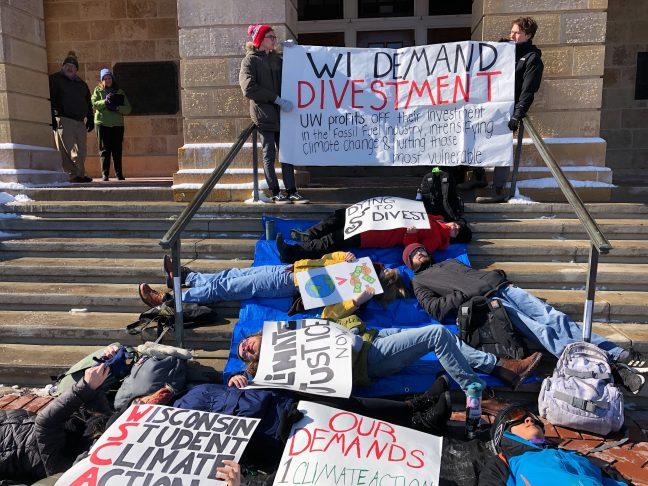A crowd of students laid at the top of Bascom Hill as part of a “die-in” protesting the University of Wisconsin’s investments in fossil fuel corporations and in honor of National Divestment Day, Thursday afternoon.
The die-in was led by Campus Leaders for Energy Action Now, in partnership with several other organizations including the newly formed Wisconsin Student Climate Action Coalition, a coalition of campus environmental groups.
Students brought signs and tarps to lay on as they chanted “dying for divestment.” Marina Minic, UW junior and executive board member of CLEAN, said the UW was joined in protest by 50 other U.S. schools. Minic said Divestment Day was created by Divest Ed, an organization working to encourage divestment on college campuses across the country.
“The fossil fuel industry is a major contributor to climate change which harms everyone and it disproportionately harms black, brown people, people who are marginalized and poor people,” Minic said. “The university actually said that they didn’t want to divest because they are a public institution and didn’t want to be political and I think we want to spread the message that this isn’t a political issue it’s like a humanitarian issue because it’s harming a lot of people.”
Participants made sure to keep a clear path for passersby, though they still drew attention. This visibility is important to WSCAC and CLEAN as they are trying to get more students involved.
Minic said they will continue to stage protests like this until UW responds, and because students pay tuition, they should care what UW invests that money in.
According to the Divest Ed website, Divestment Day marks the beginning of a mass escalation in the divestment movement. Divest Ed hopes to encourage campuses to host divestment convergences later this spring.
Minic said she hopes the symbolism of the die-in will indicate the urgency of the climate crisis.
“People are dying, just look, Australia’s on fire, the Amazon’s on fire, all the increased natural disasters and diseases,” Minic said. “People are dying so I think it’s very symbolic of the issue at hand.”


